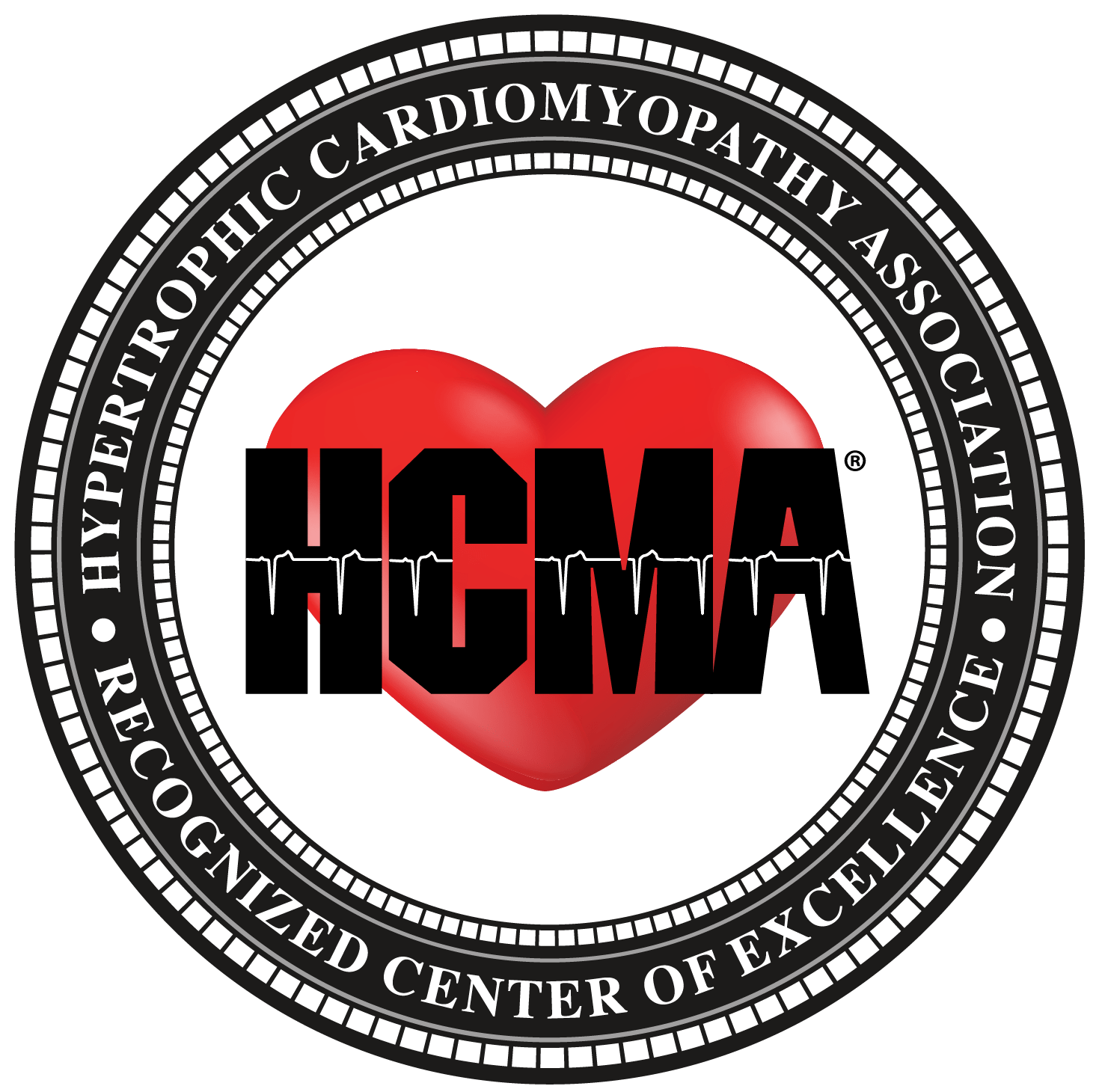Cardiomyopathy
Wellstar heart specialists create personalized treatment plans to help people manage the symptoms of various cardiomyopathies. We offer advanced treatments for dilated, hypertrophic and restrictive cardiomyopathy so you can live better.
As a Center of Excellence designated by the Hypertrophic Cardiomyopathy Association, Wellstar is one of the leading providers of comprehensive hypertrophic cardiomyopathy care in metro Atlanta.
- Overview
- Prevention
- Diagnosis
- Treatment
- Dilated Cardiomyopathy
- Hypertrophic Cardiomyopathy
- Restrictive Cardiomyopathy
- Ongoing Care
Cardiomyopathy Overview
Cardiomyopathy is a disease of the heart muscle. Left untreated, conditions in this broad category can cause congestive heart failure, advanced heart failure, stroke or arrhythmia. The goal of cardiomyopathy treatment is to decrease existing symptoms and reduce the risk of future complications. Your expert heart care team at Wellstar will work with you to create a personalized treatment plan based on personal factors and your type of cardiomyopathy.Excellent cardiomyopathy care
 As a Center of Excellence designated by the Hypertrophic Cardiomyopathy Association (HCMA), Wellstar is one of the leading providers of comprehensive hypertrophic cardiomyopathy care in metro Atlanta. Wellstar Kennestone Regional Medical Center was also the first in Georgia to receive the Comprehensive Cardiac Care Center certification—the premier cardiovascular award from The Joint Commission and the American Heart Association.
As a Center of Excellence designated by the Hypertrophic Cardiomyopathy Association (HCMA), Wellstar is one of the leading providers of comprehensive hypertrophic cardiomyopathy care in metro Atlanta. Wellstar Kennestone Regional Medical Center was also the first in Georgia to receive the Comprehensive Cardiac Care Center certification—the premier cardiovascular award from The Joint Commission and the American Heart Association. Cardiomyopathy types we treat
- Dilated cardiomyopathy (weakened and enlarged heart)
- Hypertrophic cardiomyopathy (thickening of heart muscle)
- Restrictive cardiomyopathy (stiff heart muscle) such as cardiac amyloidosis and Fabry disease
Symptoms
While you may not exhibit symptoms early on, people with cardiomyopathy can experience:- Fatigue
- Dizziness
- Rapid or irregular heartbeat
- Shortness of breath after minimal activity or from lying down
- Swelling of the abdomen
- Swelling of feet and ankles
- Weakness
It’s important to schedule an appointment with a cardiologist if you are experiencing any of these symptoms to keep your condition from worsening.
Risk factors
People of all ages can have cardiomyopathy, although risk can increase with pre-existing conditions such as:- A family history of cardiomyopathy, congestive heart failure or cardiac arrest
- Coronary artery disease
- Diabetes or obesity
- Diseases that damage the heart
- High blood pressure
- Long-term, excessive alcohol use
Expert heart care
People who choose Wellstar to manage their heart conditions can access some of the most advanced treatments and clinical trials. We offer many of the latest surgical and non-surgical techniques. Learn more about the high level of heart care at Wellstar.Cardiomyopathy Prevention
In most cases, you cannot prevent cardiomyopathy. You can take steps to lower your risk of complications and improve symptoms. Inform your healthcare provider if you have a family history of cardiomyopathy, congestive heart failure or cardiac arrest.There are several ways you can modify your lifestyle to reduce your risk for cardiomyopathy symptoms, including:
- Avoid smoking and drinking alcohol excessively.
- Eat healthy foods and reduce sodium intake.
- Exercise as recommended by your physician.
- Maintain a healthy weight.
- Monitor risk factors such as high blood pressure and diabetes.
Cardiomyopathy Diagnosis
Initial screening and blood tests
Diagnosis begins with blood tests and screenings requested by your primary care physician or cardiologist. These are based on your family history, medical history and existing symptoms. Further cardiac diagnostics and imaging may be needed if you have abnormal results.
Advanced cardiac diagnostics & imaging
- Electrocardiogram (ECG or EKG)
- Echocardiogram
- Cardiac stress tests and stress tests with imaging
- Cardiac computerized tomography (CT)
- Cardiac magnetic resonance imaging (MRI)
- FDG PET imaging
- Nuclear imaging/SPECT study
- Coronary catheterization and biopsy
Each test—performed by a skilled specialist—will help your cardiologist get a clearer picture of your condition. From there, they’ll refer you to a cardiomyopathy specialist if needed.
Genetic counseling
Cardiomyopathy Treatment
At Wellstar, we provide comprehensive services across our heart specialists’ offices, hospitals and cardiac diagnostics and rehabilitation. Working together, you’ll receive comprehensive treatment from a dedicated team of physicians, nurses, rehabilitation specialists, genetic counselors and staff who all place your care as their top priority.The goals of your cardiomyopathy treatment are to manage your symptoms, prevent the conditioning from worsening and reduce your risks of further complications. Treatment methods—medications, surgery, implantable devices and, in the most severe of cases, heart transplants—vary greatly depending on the type of cardiomyopathy you have.
What to expect at your appointment
Your treatment will begin with a referral from your doctor to a cardiomyopathy specialist, who will carefully review all known information about your condition and related medical history. Then we’ll reach out to you directly to schedule an appointment.We’ll discuss your condition at your visit and present a customized treatment plan based on your unique factors. It may consist of medications, surgery or a combination depending on your type of cardiomyopathy and other personal considerations.
Because people with cardiomyopathy are at greater risk for fatal arrhythmias and other severe heart conditions, further treatments may be recommended if medication alone does not fully address your condition, including:
- Septal ablation by an interventional cardiologist
- Implantable devices (ICD, pacemaker) by an electrophysiologist
- Surgery, including a septal myectomy and mitral valve repair by a cardiovascular surgeon
Cardiac rehabilitation
Wellstar offers world-class cardiac rehabilitation at multiple locations. Our team works together to help people learn lifelong, heart-healthy behaviors and lower their risk for future heart issues. We support you in reaching your optimum recovery after a cardiac event or procedure.Dilated Cardiomyopathy
If you’re diagnosed with dilated cardiomyopathy—the most common type—your treatment plan may include a wide range of medications, ablation therapy or surgery.Hypertrophic Cardiomyopathy
 As a Center of Excellence designated by the HCMA, Wellstar is one of the leading locations offering comprehensive hypertrophic cardiomyopathy (HCM) care in metro Atlanta.
As a Center of Excellence designated by the HCMA, Wellstar is one of the leading locations offering comprehensive hypertrophic cardiomyopathy (HCM) care in metro Atlanta.HCM is a genetic disease that causes the heart muscle to thicken and stiffen, making it harder for the heart to pump blood. It can be either obstructive or nonobstructive.
HCM can cause:
- Obstructed blood flow: The thickened heart muscle can block blood flow out of the heart.
- Decreased blood volume: The heart can hold less blood, so less blood is pumped to the body with each beat.
- Increased energy and oxygen needs: The heart needs more energy and oxygen to work, especially during exercise.
- Abnormal heart rhythms: The abnormal heart cells in HCM can cause abnormal heart rhythms.
- Sudden cardiac death: HCM is the most common identifiable cause of sudden cardiac death in healthy people under 35 in the United States. Symptoms include chest pain, shortness of breath, dizziness, feeling like you're going to pass out and a fast heartbeat
Your personalized HCM treatment plan may include prescribed medication or surgery, including surgical myectomy, alcohol septal ablation and mitral valve repair surgery. We have experience with medications for HCM including myosin inhibitors. Ablation or an implanted device may also be recommended. These procedures are currently performed at Wellstar Kennestone Regional Medical Center, Wellstar MCG Health Medical Center and Wellstar Paulding Medical Center with plans to expand to more locations for the convenience of our patients.
Restrictive Cardiomyopathy
Restrictive cardiomyopathy treatment plans can include medications paired with lifestyle changes. Medicines may include diuretics, ACE inhibitors, blood thinners and medication that helps prevent abnormal heart rhythms. Due to swelling associated with restrictive cardiomyopathy, you may need to modify your diet and reduce your salt intake. In advanced cases, patients may be referred to an advanced heart failure specialist.Ongoing Care for Cardiomyopathy
Wellstar provides access to world-class, community-based heart experts and treatments across Georgia. With access to the latest technology and evidence-based treatments, our team is here to help you:- Provide early and appropriate care for acute illness to prevent its progression.
- Offer advice and support to prevent illness and injuries.
- Rehabilitate from major surgery and heart events.
- Create and maintain a healthy lifestyle.
Once you go home
Should your treatment plan require a stay at a Wellstar hospital for any time, ongoing care will continue at home. Although cardiomyopathy is a chronic condition, treatment often improves symptoms and quality of life. As a result, pay close attention to your body and your post-treatment regimen created by your heart care team. Contact us with any questions or if any changes occur.Another component of your ongoing care at home will include maintaining a healthy diet and adding exercise to your routine.

